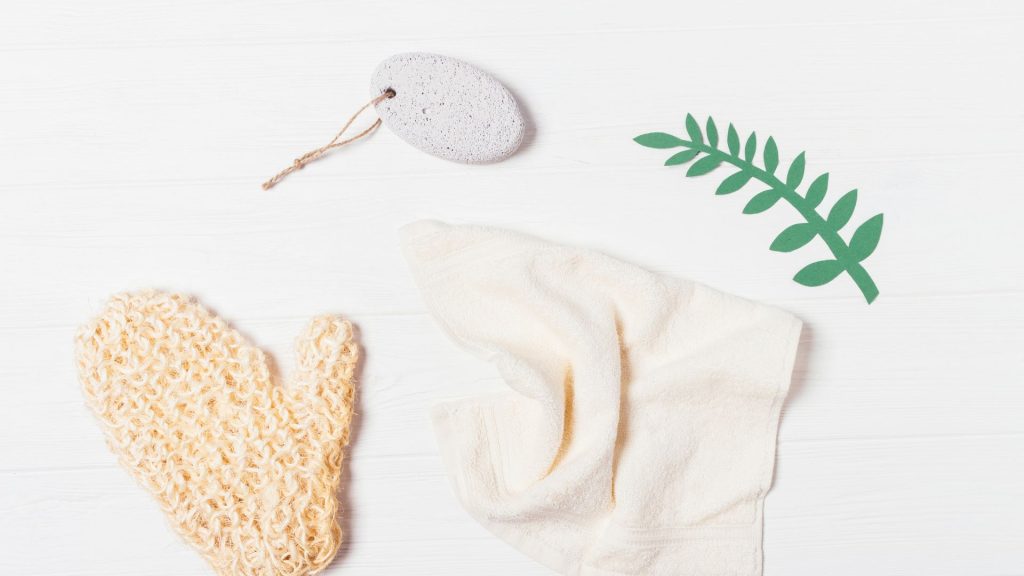Skin exfoliators – such as scrubs, dry body brushes and loofahs–are an indispensable way to achieve that coveted glow. Plus, they help your moisturizer work more effectively!
Chemical exfoliants are skincare ingredients designed to exfoliate dead skin cells. Chemical exfoliants come in two varieties – BHAs (oil-soluble) and AHAs (water-soluble). Chemical exfoliators can be used on all skin types and are considered gentler alternatives to physical scrubs.
1. Removes Dead Skin Cells
Your skin is continuously producing new cells to replace those that have died, replacing the old with fresh ones from underneath. While old cells should naturally shed themselves over time to make room for newer ones, sometimes they get stuck clogging the drain leading to dryness, dull skin or breakouts.
Skin exfoliators remove dead cells to accelerate cell turnover and reveal fresh, healthy skin beneath. Furthermore, exfoliation enables serums, moisturizers and anti-aging products to penetrate more effectively into the epidermis.
There are various methods of exfoliation available, from scrubs and brushes to chemical applications like alpha hydroxy acids (AHAs) or beta hydroxy acids (BHAs). These chemicals work by dissolving dead skin cells without harming the complexion; those with dry or sensitive skin will benefit most from AHAs while those with oilier complexions should try BHAs as these will unclog pores and regulate sebum production. When exfoliating, always follow up with an intense moisturizer afterward for best results.
2. Clears Clogged Pores
Dead skin cells naturally exfoliate from our bodies daily, but sometimes they build up and clog our pores. This may happen when oil from sebaceous glands gets “stuck” under dead cells leading to breakouts for oily or acne-prone skin types or when makeup products, dirt and pollution settle on our bodies that combine with sebum to block pores.
Regular exfoliation helps clear away this buildup and keeps pores free of blemishes, as well as helping skincare products penetrate more efficiently into the skin for maximum effect.
Physical exfoliation with scrubs works well on most skin types but can be too harsh for sensitive skin types. Chemical exfoliation using AHAs (alpha hydroxy acids) or BHAs (beta hydroxy acids) is gentler, though must be used correctly. Farris recommends using one containing salicylic acid which penetrates deeper into pores to break down impurities and prevent clogging.
3. Makes Skin Glowing
Exfoliation is key for attaining that baby-smooth complexion we all covet. By clearing away dead cells that clog pores and dull the complexion, exfoliation allows serums, moisturizers, and masks to penetrate more deeply into your skin for maximum benefit.
No matter your skin type – dry, oily or acne prone – an exfoliator can benefit it in many ways. Physical and chemical exfoliators both help promote smooth, radiant complexions by exfoliating dead cells off and speeding up cell turnover rates.
Chemical exfoliants utilize Alpha Hydroxy Acids (AHAs) to effectively exfoliate dead skin. Oily skin may benefit from using Lactic and Glycolic acids while sensitive skin types might prefer salicylic acid as their exfoliator of choice.
Always exercise caution when exfoliating, particularly if you suffer from skin conditions like eczema or rosacea. Exfoliating too frequently or using an inappropriate product can irritate and inflame the skin causing redness and damage; to maintain good skin health and minimize irritation you should exfoliate only once or twice every week using gentle scrubs or chemical exfoliators.
4. Helps Your Moisturizers Work Better
Exfoliation is an integral component of skincare routine. Exfoliating allows your skin to appear healthier, smoother, and radiant while increasing penetration of other skincare products such as serums, oils and moisturizers.
Manual exfoliants such as scrubs with gritty textures or cloth, sponge or loofah can help gently exfoliate dead skin cells from your pores. Chemical exfoliators that contain ingredients to dissolve dead skin cells – alpha hydroxy acids like glycolic acid or beta hydroxy acids like salicylic acid are examples – also come in face masks, toners or facial pads form and should also be considered an option.
Exfoliants promote cell rejuvenation by stimulating new skin cell development. However, it’s essential that both physical and chemical exfoliants be used regularly; otherwise they could leave your skin red, irritated and flaky. Aim for exfoliation once or twice weekly using products tailored specifically for your skin type.


